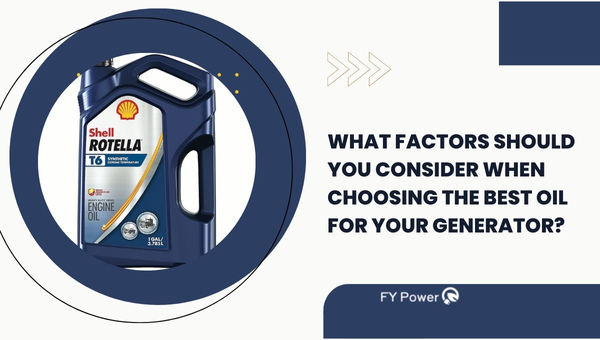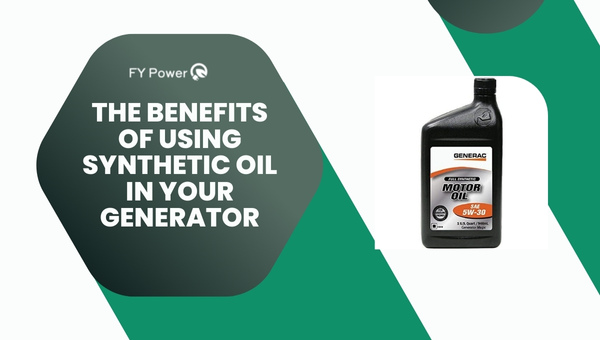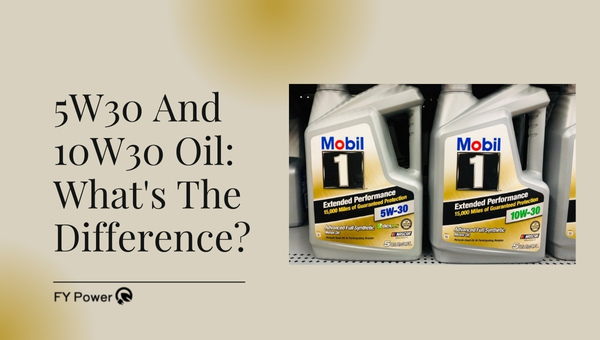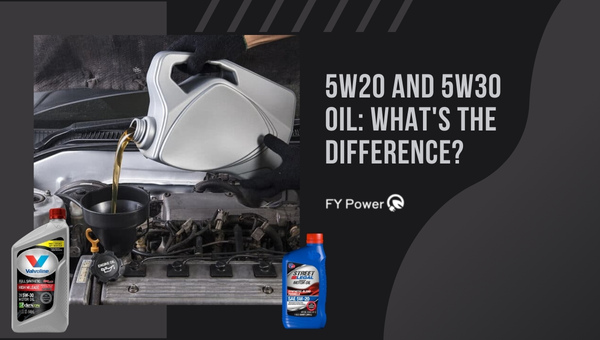Generators are invaluable equipment, providing essential power during emergencies, outdoor activities, or just being the cornerstone of a good backup plan for your home or business. However, to keep your generator running smoothly and efficiently, selecting the right oil for the generator is critical.
The oil lubricates the generator’s engine, minimizing friction, reducing wear and tear, and maximizing its lifespan. But with so many types of oil on the market- conventional, synthetic, high-mileage, diesel-specific – each with its own set of advantages- choosing the best one for your generator can be daunting.
It’s not only about the type but also about the right viscosity, as indicated by the SAE rating. Furthermore, the choice of oil might depend on the climate in your area, as well as the age and the make of your generator.
This guide aims to simplify your selection process, providing a comprehensive understanding of different oil types, how they function, and tips on choosing the best oil for the generator. By making the right choice, you ensure that your generator remains reliable, ready to power up when you need it the most.
Types of Oil For The Generator
The oil used in a generator can vary depending on the type and model of the generator. However, it’s usually a type of motor oil, just like the kind you’d use in a car or motorcycle.

Here are some common types of oil that might be used in a generator:
- Conventional Oil: This is the most common type of motor oil. It’s derived directly from crude oil and provides good protection for most engines under normal conditions. It’s also typically the least expensive type of oil.
- Synthetic Oil: This high-performance oil is chemically engineered to provide superior engine protection. It’s usually more expensive than conventional oil but can protect the engine better under extreme conditions. It also tends to last longer, which can result in fewer oil changes.
- Synthetic Blend: This is a blend of conventional and synthetic oils. It offers some of the benefits of synthetic oil, such as improved performance under extreme conditions but at a lower cost.
- High-Mileage Oil: This type of oil is specially designed for engines that have a lot of miles on them. It contains additives that help to reduce engine wear and prolong the life of the engine.
- Diesel Oil: If your generator uses a diesel engine, it will likely require a type of oil designed specifically for diesel engines.
Please note that the viscosity of the oil (measured by its SAE rating, such as SAE 30 or 10W-30) is also important. The right viscosity will depend on the specific model of your generator and the ambient temperature in which it operates. Always refer to the owner’s manual of your generator for the manufacturer’s recommended oil type and viscosity.
Read, 5W20 and 5W30 Oil: Difference, Uses, Shopping Guide
What factors should you consider when choosing an oil for your generator?
When choosing oil for your generator, there are several key factors you should consider:

- Generator’s Manufacturer Recommendations: Always check the owner’s manual or manufacturer’s specifications for your generator first. It will usually specify the type of oil that is recommended for optimal performance and longevity of the generator.
- Oil Viscosity: The viscosity of oil (its thickness or fluidity) is an essential factor. The correct viscosity will depend on the temperature at which your generator will be operating. Higher viscosity oils, like SAE 30, are more suitable for warm climates, while lower viscosity oils, like 10W-30, are more suited to colder climates.
- Type of Oil: Consider whether you need conventional, synthetic, or synthetic blend oil. Conventional oil is usually adequate for most generators under normal conditions. Synthetic oils provide better performance under extreme conditions and typically last longer but are more expensive. Synthetic blend oils can offer a balance of performance and cost.
- Operating Conditions: If your generator is subjected to extreme temperatures or heavy loads, synthetic oil may be a better choice. In contrast, conventional oil may be sufficient for light-duty generators used occasionally.
- Engine Type: If your generator has a diesel engine, it will need oil specifically designed for diesel engines.
- Generator Age and Usage: Older generators and those with high mileage might benefit from high-mileage oil-containing additives to prolong engine life.
- Oil Additives: Some oils contain additives that provide extra engine protection, reduce friction, and keep the engine clean. Check the oil label for information about additives.
By considering these factors, you can choose the best oil to maintain your generator’s performance and extend its lifespan.
advantages of using synthetic oil in your generator
Synthetic oil has been engineered to perform optimally under a wide variety of conditions, offering several advantages over conventional oil when used in a generator:

- Better Temperature Resistance: Synthetic oil has better high-temperature stability and doesn’t break down as quickly as conventional oil. This helps prevent deposits and sludge formation, which can clog your engine and reduce its efficiency.
- Improved Cold-Weather Performance: Synthetic oil also performs well in cold weather. It flows more freely at low temperatures than conventional oil, allowing for easier starting and better lubrication when the generator is first turned on.
- Extended Drain Intervals: Synthetic oils generally last longer than conventional oils before they need to be changed. This can extend the time between oil changes, potentially saving you time and money.
- Reduced Engine Wear: Synthetic oil often provides better lubrication than conventional oil, which can reduce wear and tear on your generator’s engine and prolong its lifespan.
- Improved Fuel Efficiency: Because synthetic oil can provide better lubrication and reduce friction, it can also improve the fuel efficiency of your generator.
- Environmentally Friendly: Due to its long lifespan, less synthetic oil needs to be disposed of compared to conventional oil, making it a more environmentally-friendly choice.
- Cleaner Operation: Synthetic oils typically contain fewer impurities than conventional oils, which can lead to cleaner operation and less build-up of deposits within the engine.
Remember always to check your generator’s manufacturer recommendations. Some engines are specifically designed to work with synthetic oil, while others may not need it.
Check This Too, Guide To Generac Generators Oil Types and Capacities
The advantage of using Conventional oil in your generator
While synthetic oil often offers superior performance under extreme conditions, conventional oil can still offer several advantages when used in a generator:
- Cost-Effective: Conventional oil is typically less expensive than synthetic oil. If your generator is used in normal conditions and doesn’t require the high performance that synthetic oil provides conventional oil can be a more cost-effective choice.
- Compatibility: Older generators were designed during a time when synthetic oil was not as commonly used. As a result, these older machines may run better on conventional oil.
- Sufficient for Moderate Conditions: Conventional oil will typically provide adequate protection for your generator’s engine if your generator operates under moderate conditions — not too hot, cold, or under heavy load.
- Easy Availability: Conventional oil is widely available and can be found at virtually any store that sells motor oil.
- Frequent Oil Changes: While this may not seem like an advantage, frequent oil changes that come with using conventional oil mean that you are regularly removing dirt and debris, which can help keep the engine clean.
- Suitable for Short Run Times: If your generator is used infrequently or for short periods of time, conventional oil can be an appropriate choice since you won’t necessarily benefit from the long-life characteristics of synthetic oil.
It’s important to note that the choice between synthetic and conventional oil may depend on your generator’s specific make and model and the conditions under which it operates. Always refer to the owner’s manual for the manufacturer’s recommendations.
What are the common mistakes people make when selecting oil for their generators?
Choosing the right oil for your generator is crucial for its performance and longevity. Here are common mistakes people make when selecting oil for their generators:
- Ignoring Manufacturer’s Recommendations: The generator’s manual usually contains specific oil type and viscosity recommendations. Ignoring these guidelines can result in poor performance or even damage to your generator.
- Not Considering Climate: The outside temperature can significantly impact the effectiveness of the oil. Higher viscosity oils are more appropriate for hotter climates, while lower viscosity oils are better for colder temperatures.
- Using Car Oil for Generators: While both car engines and generators need motor oil, they don’t always require the same type. Always use the oil recommended for your specific generator.
- Not Changing Oil Regularly: Regardless of the type of oil used, it should be changed regularly. Old oil can lose its effectiveness and lead to increased wear and tear on the engine.
- Choosing Based on Price Alone: While cost is an important factor, choosing the cheapest oil could end up costing more in the long run if it leads to reduced generator performance or damage.
- Using Diesel Oil in Gasoline Engines (and vice versa): Diesel and gasoline engines have different requirements and need different types of oil. Using the wrong one can lead to serious engine problems.
- Not Checking Oil Levels: Even the best oil won’t do much good if there’s not enough of it. Be sure to check oil levels regularly and top up as necessary.
Avoiding these mistakes can help ensure that your generator runs smoothly and lasts as long as possible. Always refer to the owner’s manual or contact the manufacturer if you’re unsure about which oil to use.
By following these tips, you can be sure you will get the right oil for your generator to run smoothly and efficiently.
Conclusion
Choosing the right oil for your generator or motor is essential to keep your engine running smoothly and efficiently.
From conventional to synthetic oils, each type comes with its unique characteristics and benefits. Your decision should factor in the generator’s specifications, the environmental conditions where it operates, the frequency of usage, and your maintenance schedule.
Taking the time to read up on what type of oil you need, shopping around for a reliable brand, and referring to the manufacturer’s manual are all essential steps to ensure you get the best product.
With these tips in mind, you should be able to find an oil that meets your needs while protecting your engine from wear and tear.

